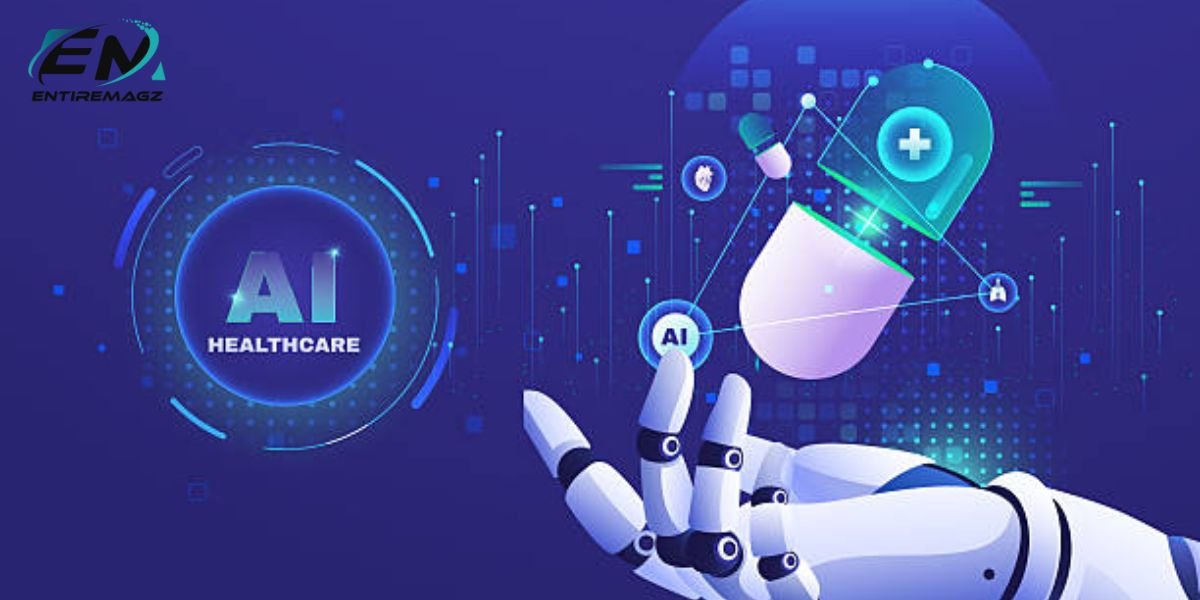Artificial intelligence (AI) is not just a buzzword on conference slides; it is now a daily life real scenario in clinics, labs, hospitals, and even operating theaters.
Across imaging suites, genetic research facilities, patient portals, and care treatments, AI is expanding human expertise and speeding up medical procedures, whether it’s about diagnoses, personalised treatments, or easing bottlenecks for long and limited access to care.
AI’s promise is not to replace clinicians but to empower them. AI is turning tables by providing actionable insights on mountains of data. AI is helping clinicians on repetitive or iterative tasks to stay focused and devoted to patient interaaction for the best decisions.
The healthcare market size with AI applications is growing, as multi-billion-dollar growth is derived from imaging, diagnosis, and digital healthcare solutions.
For instance, there’s a prediction that, year over year, the gains in market reach hundreds of billions of dollars over time.
It reflects that hospitals, clinics, which are providers, payers, insurers, and drug marketers, life sciences are using this system frequently. It is expected to reach about $180 billion to over $500 billion by 2030, depending on different factors.
Why AI matters in Healthcare?
AI matters in healthcare because it plays playing crucial role when it comes to improving outcomes, cost reduction, and enhanced performance in multiple dimensions.
AI can analyze complex datasets and identify the patterns that can be ignored or unseen by humans. AI enables the accurate and earlier detection of diagnoses that a human eye can sometimes miss.
The timely interventions and improved survival rates in different diseases are raising the use of AI in healthcare. AI models can predict the ratio of risk and cure by analyzing a patient’s data quickly with a proactive management approach.
This helps resources to allocate and react more quickly to reduce the emergencies. AI supports the automation tasks such as scheduling, claims, processing, and documentation of clinical workflows, and reduces manual labor and lowers the cost.
AI speeds up the synthesis, identification of individuals, and biomarker discovery, which shortens the development timeline and reduces the costs for new therapeutic trials.
| Key Takeaway AI’s value in healthcare stems from its ability to process the large and complex datasets. It further supports faster decision-making and provides personalized treatment methods than traditional methods. It results in better care of patients, cost efficiency, and thoughtful governance in matters of safety, ethics, and equity. |
Real-World AI Applications In Healthcare
1- Automated diagnostics
Automated diagnostics use artificial intelligence (AI) and machine learning (ML) to assist in or replace human interpretation of medical data, including medical imaging, slides, pathologies, and results from labs.
These systems are designed for improved accuracy, speed, and consistency to reduce clinician workload and costs. Automated diagnostics covers
- Medical imaging analysis includes radiology, pathology, and dermatology. They use deep learning and computer vision.
- Automated pattern recognition is run in labs, tests, and on genomic data.
- Automated diagnostic helps in Decision-support artifacts to flag different patterns, including abnormalities, prioritization of cases, and to measure findings.
- Hospitals and clinics are facing the demand for faster turnaround time regarding workforce and other challenges, so AI-based diagnostics help in pre-screening and standardized interpretation of high-volume settings.
- AI tools are continuously increasing with existing information systems, for instance, PACS, LIMS, to streamline workflows and achieve faster results.
| Key Takeaway AI-powered diagnostic accuracy across certain medical tasks is doing well, such as finding signs of diabetic eye disease and spotting issues in mammography in 2025 tests. AI in departments of radiology and pathology is moving forward from pilot projects to real-world clinical use. They are working in different institutions, including FDA-ready software as a medical device (SaMD) pathways |
2- Personalized treatment and targeted therapy with planning
AI technologies analyze large volumes of data from multiple sources, including EHR (electronic health records), genetic tests, wearable devices, lifestyle choices, and inputs.
Machine learning and AI-powered algorithms convert complex data into narrow patterns that are often overlooked in traditional medical methods.
For instance, Advanced AI systems can assess the variation in an individual’s DNA that can affect their metabolism or treatment response.
- AI algorithms can improve 87% of diagnostic accuracy in oncology and radiology.
- AI models can enable precision medicine approaches, which can reduce drug reactions by 50%.
- AI models prevent drug reactions in an individual by identifying high-risk profiles.
- AI-based insights help in optimizing the dosage of drugs for maximum effects.
- They increase the new drug discovery by analyzing vast biochemical databases.
| Key takeaway Predictive modes can identify the patient’s risk of cardiovascular disease with 85% accuracy. These models have identified 23 such patients through collaborative research by Scripps Research Institute and Intel. |
3- Chatbot-based and Virtual nursing assistants
Chatbots are AI-programmed designs used to interact with patients, and they provide answers to the questions regarding symptom assessment, scheduling of appointments, medical reminders, reminders for medicine, and other health-related issues and education.
Virtual assistants are an AI advanced system with active support of nursing tasks.
- Chatbots such as Florence give reminders to patients about medications and post-care routines. This is increasing 79% of health literacy.
- They help patients with the discovery and advice for medical health care.
- These chatbots are helping in administrative tasks such as scheduling appointments and listening to FAQs of patients to reduce the clinical staff and allow more focus on patients’ health.
- These assistants help remotely in monitoring different tasks, including vital signs for health issues, management of chronic diseases, and triaging symptoms.
| Key takeaway The global healthcare chatbot market is thriving. It is estimated to reach $1.49 billion in 2025 and soar to $10.26 billion by 2034. The CAGR (compounded annual growth rate is around 24%. AI-powered chatbots are estimated to save the cost of the healthcare industry $3.6 billion globally by 2025 by reducing administrative tasks and operational costs |
4- Robotic-assisted surgery and operations
Robotic-assisted surgery is the most impactful application of artificial intelligence in healthcare. The global market of robotic surgery was valued at USD 13.79 billion in 2025, and it is expected to grow to USD 54.66 billion by 2034.
North America is currently leading in the market, while it is expected that the Pacific region will experience growth due to enhanced healthcare investments in technology adoption.
- AN AI-based robotic system helps in surgery and performs surgical operations with accuracy, efficiency, and reduces complications by 30%. It is improving surgical margins in complex operations, including tumor resections.
- According to studies, 25% of the surgery duration is reduced with the assistance of AI. It decreased the patients’ exposure to anesthesia and hospital stays.
- Patients who experience robotic surgery assisted by AI experienced less blood loss, fewer pains, and minimal scarring. They recovered 15% faster compared to traditional surgery methods.
| Key takeaway AI-assisted surgeons with predictive and real-time analysis help in decision-making making workflow efficiency, and 20% reduced surgeon fatigue. 42.5% of smaller hospitals and 15.1% of larger hospitals in the U.S are adopting robotic surgery techniques |
5- Virtual health coaching and chronic disease management
Virtual health coaching with AI chatbots guides the patient about lifestyle changes, medication adherence, and medical education. AI chatbot advises patients about diet, exercise, medicine schedules, and promotes healthier habits with better outcomes.
- chronic diseases such as diabetes and hypertension impact global health and affect millions of human worldwide.
- AI-powered disease management analyzes the patient’s data with lifestyle information. This allows the early detection of complicated and timely interventions.
- Machine learning models analyze and outperform risk levels and predict complications with higher accuracy to reduce the chances of chronic disease damage.
- AI-based conversational agents have increased the adherence rates in underserved areas where healthcare access is limited.
| Key takeaway According to studies, AI applications in diabetes reduced the incidence of hypoglycemia and improved glycemic control |
Final Thoughts
AI is helping in making evidence-based decisions about patients’ health by analyzing real-world data, guidelines, and the latest research.
AI’s importance in Healthcare is not a single breakthrough moment, but it is actually a continuous, practical, and applicable standard.
AI applications such as predictive analysis and preventive medication with diagnosis and interventions are enhancing patient care and treatment.
For instance, AI models have helped cancer patients with survival and 80% accurate results for earlier personalized treatment plans. Additionally, AI systems can reduce the hospital administration and reduce the clinical costs.
These developments reflect the impact of AI on the healthcare sector by supporting timely and supportive individualized medical decisions.
AI is continuing to grow more advanced every single day and holds the strong potential for health outcomes with proactive and efficient efforts.
Read More Posts
AI in Business: AI applications in transforming business operations
Transforming the Educational World: 10 Real-World Applications of AI in Education

